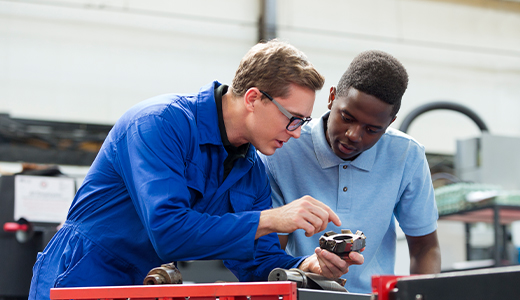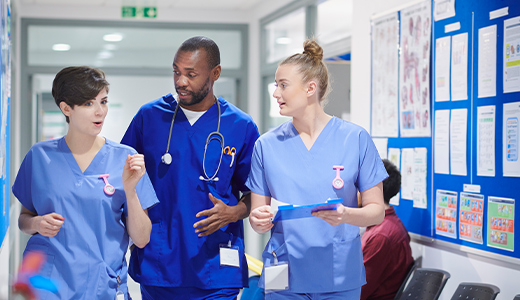Dental schools in the UK usually require work experience. This is typically done in a General Dental Practice (GDP) as most graduates tend to go into this area once they leave university. Typically universities ask for 2 weeks of work experience – this can be made up of multiple placements or one longer placement.
Crucially getting work experience that will benefit you in a career in dentistry is about far more than just getting a placement in a General Dental Practice. That’s because there are many ways to get exposure to environments and skills that are relevant to a career in dentistry, for example, volunteering and care work.
But let’s get started…
1. Register interest in Springpod’s Dentistry Virtual Work Experience
It would be silly not to start with what we think is the best way to get dentistry work experience, especially given the current situation with COVID-19. Springpod are offering a Dentistry Virtual Work Experience programme that will be taking place in 2021. The programme runs for two weeks, there will be live webinars where you can ask questions and you’ll need to complete work and assignments in order to receive your certificate. You can register your interest here to be alerted when the programme opens for applications.

2. General Dental Practice Placements

The most common form of Dentistry work experience is to get a placement with your local general dental practice. Securing a placement is difficult at the best of times and is particularly difficult during lockdown but when things return to normal your best bet is to politely but persistently get in touch with your local practice. Don’t be afraid to pick up the phone, you’ll get an answer more quickly than if you email. If that doesn’t work it’s worth visiting the practice yourself and politely asking to speak to the manager.
3. Hospital Placements

If you’re able to get work experience in a hospital then this will look fantastic on your university application. It will also give you an idea of whether there are any other roles based within a hospital that might interest you. It’s difficult to get a sense of quite how many jobs there are within the NHS. Your best options are to try to secure the opportunity to shadow a hospital dentist or see if there are opportunities to do voluntary work within a hospital. Voluntary work within a hospital often involves talking to patients, serving refreshments or welcoming people at an reception as they enter. Again, Springpod offer a number of different NHS Virtual Work Experience programmes so it’s worth taking a look at their medicine, nursing, allied health professions, support services and introduction to healthcare programmes.
4. Volunteering Placements

Volunteering is one of the best ways to learn new skills and to get experience of working in different environments. There are a huge number of different volunteering opportunities including: volunteering in a care home, volunteering in a charity shop, volunteering with a charity supporting them with admin work or supporting them to deliver services. Volunteering will allow you to show that you have communication skills and experience of caring for others.
5. Speak to your school or college

In order to get valuable work experience to add to your CV or personal statement you need to speak to your existing contacts and use your network. It’s easy to overlook the contacts that you already have. A great place to start is by speaking to your school. It’s very likely a teacher at school has a contact who is a dentist and may be able to offer you a placement. As always, it’s crucial to be polite and persistent, you’re asking someone to do you a favour so you should explain why you’re motivated to gain work experience and thank them for their time.
6. Speak to dentists
You can gain a huge amount from simply speaking to Dentists. If a dentist isn’t able to give you a work experience placement ask if they’d be willing to give you 15 minutes of their time. Either over the phone or virtual chats can be very helpful, be sure to make a list of appropriate questions beforehand and to reflect on what you’ve learnt afterwards.
7. Dentistry MOOCs (Massive Open Online Courses)

A number of dental schools offer free access for students so you can watch lectures and see the work dental students complete. While this isn’t work experience it’s still a great experience and will help demonstrate your interest in your personal statement. Sheffield University Dental School has a MOOC where students can learn about different roles in dental practices, and an introduction into tooth anatomy and disease. Take a look at a few options here:
– University of Sheffield
– Discover Dentistry
– Dentistry MOOCs and Free Online Courses
8. Private Dentistry

It’s worth getting experience of a private dentistry as well as a practice that offers NHS treatments so that you can see the difference. Private dentistry will usually include patients who wanted faster treatment than they could get through to the NHS or patients who wanted cosmetic dentistry. During your interview for Dental school you’ll be able to discuss the differences between the private and NHS sectors and use it to answer questions about the value of the NHS.
9. Orthodontics

Gaining experience of Orthodontics is another way to build up more rounded Dentistry work experience. Orthodontics is a speciality of Dentistry that is concerned with malocclussions or improper bites. It’s basically about the correction of irregularities of the teeth. Orthodontists focus on fitting, cavity restoration and changing dental braces. Experience with an Orthodontist you gain insight into a different field of Dentistry, and how this speciality cooperates with other fields such as General Practice. You will also be able expand your knowledge of specialist procedures.
10. A Dental Laboratory

Dental Laboratory work experience is another string to add to your bow. Experience within a laboratory will give you the chance to see what a Dental technician does and why they’re important for a practising dentist. A technician often makes the dental appliances for General Dentistry and Cosmetic Dentistry, including: crowns, dentures, implants and bridges. During experience at a Dental laboratory, you may be given the opportunity to make a dental appliance!
11. Oral and Maxillofacial surgery

Oral and maxillofacial Surgery (OMFS) consultants diagnose and treat patients with diseases affecting the neck, mouth, jaws and face. Learn more on Health Careers. They offer another route to gain invaluable experience. Find out the details of your local clinic through your NHS Trust and get in touch.
12. Community dental practice

Some people are unable to attend a General Dental Practice. They may have learning disabilities or physical impairments that make it difficult to attend the main practice. They may also have a fear or phobia of going to the dentists and so another form of treatment is required. This is where a community dental practice comes in. Have a quick search online and you should be able to find your local practice.
13. Consider caring roles
Caring work is impressive on your personal statement, cv or as something to discuss during your interview. It shows that you understand what’s actually involved in caring for people. Most work placements will require you to be at least 16 years old. It will give you the chance to speak with patients and care professionals. Most importantly it will let you see if this type of work is really for you.
14. Join the British Dental Association
Take a look at the British Dental Association (BDA). It’s worth considering becoming a student member. You’ll get access to its student magazine, journal and its dental library and e-books.
15. Do a dental placement in a foreign country
There are numerous companies offering paid or free dental placements in a foreign country. These will allow you to gain an understanding of the differences between countries and again to get some direct experience of dentistry.










